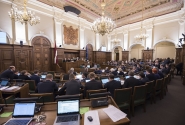
On Thursday, 29 October, the Saeima in the final reading passed amendments to the Electronic Mass Media Law aimed at restricting retransmission of hate speech propagated by foreign-owned media.
According to Inese Laizāne, Chairperson of the Saeima Human Rights and Public Affairs Committee, amendments bring us one step closer to restricting retransmission of hate speech propagated by foreign-owned media. The new provisions set out a clear protocol for limiting the broadcasting of foreign-owned digital media that gravely violate national standards.
The amendments introduce the requirements of the Audiovisual Media Services Directive into the national legislation. They outline the procedure for the National Electronic Mass Media Council (NEPLP) to follow in case of violations and envisions steps for limiting them.
The amendments require the NEPLP to provide foreign electronic media free reception and does not restrict retransmission of audio-visual programmes and services in the territory of Latvia. However, the law requires that the steps are outlined for the NEPLP to issue broadcasting prohibition for foreign-owned programmes and services if they violate national standards by, for example, propagating hate speech or children’s rights violations.
The Saeima also supported changes in the transitional provisions. From 1 January 2016 those radio programmes that were previously required to offer at least 51% of their content in Latvian will have to fully switch to Latvian-only content.
The amendments adopted by the Saeima in the third and final reading also aim to expand the range of free TV channels. On top of the existing mandatory standards, cable television channels will be required to provide mandatory content in four other categories: analytical and news programmes created in the EU member states, programmes offering at least 50% of their content or transmission time in the Latvian language, popular science programmes in one of the EU’s official languages, and programmes primarily intended for children and youth.
Saeima Press Service







